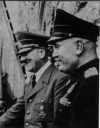World War II officially began on September 1, 1939, when Germany invaded Poland. But the causes of the war go back a few years. The Great Depression was a worldwide depression. It hit Germany especially hard. Germany was still paying very high amounts of reparations, or "money to repair damage done," to England, France, and other countries that Germany had fought against in World War I (1914-1918). When the Great Depression hit, Germany found it very difficult to feed its own people, let alone pay reparations to other countries. German money was close to being worthless, and the German people were distrustful of their government's ability to solve the problem.
In the next few years, Germany "added" more territory, annexing the Sudetenland (a part of Czechoslovakia) and all of Austria, in 1938. The next year, Germany signed a secret agreement with the Soviet Union that allowed Germany to attack other countries without fearing a Soviet response. Fearing no attack from the east, Germany invaded Poland and waited for the fight with Britain and France. Next page > Axis Expansion > Page 1, 2 |
|
Social Studies for Kids
copyright 2002–2024
David White

 In
1933, the National Socialist Party won a majority of the
government. A man named Adolf Hitler (left) was elected
chancellor (a position similar to prime minister). He took
over the government and made it a dictatorship, with himself
at the top.
In
1933, the National Socialist Party won a majority of the
government. A man named Adolf Hitler (left) was elected
chancellor (a position similar to prime minister). He took
over the government and made it a dictatorship, with himself
at the top.

